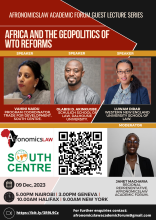China and the United States Lock Horns in Africa’s Critical Minerals Race
Once again, Africa finds itself trapped in the geopolitical tussle between China and the United States. This time, it is the struggle over Africa’s critical minerals. Beginning in August 2022, President Joe Biden of the United States signed the Inflation Reduction Act (IRA) into law with the promotion of American investments in clean energy and climate-driven technologies as a primary goal of this law. The IRA’s corollary objective was the promotion of environmental justice in the United States. Therefore, for both energy capitalists and transition economy enthusiasts, this was supposed to be a win-win situation. However, more was unsaid. The IRA’s passage was not only about building American industries and homegrown green technologies. One of its goals was to significantly reduce America’s reliance on China for the supply of critical minerals.
Despite the significant steps taken under the IRA to reduce American dependence on China for critical minerals, it is evident that the United States feels the need to do more. Recently, the United States Senate passed the Intergovernmental Critical Minerals Task Force Act (ICMTFA). The expectation is that the ICMTFA would ramp up American efforts to reduce its demand on China and other states the United States labels as adversarial states. Together, a combined reading of the IRA and ICMTFA represents a new frontier of American national security interests styled as clean energy laws and transition policies. These developments take place against a backdrop of a significant demand in critical minerals that will outpace supply in less than two decades from now. These maneuvers also speak to the lesser-explored American experience with China nearly a decade ago in a dispute involving China’s restrictions on the export of rare earth minerals. The United States, together with other states, challenged China’s export quotas at the Dispute Settlement Body (DSB) of the World Trade Organization (WTO). The DSB ruled that China’s restrictions violated WTO law.
